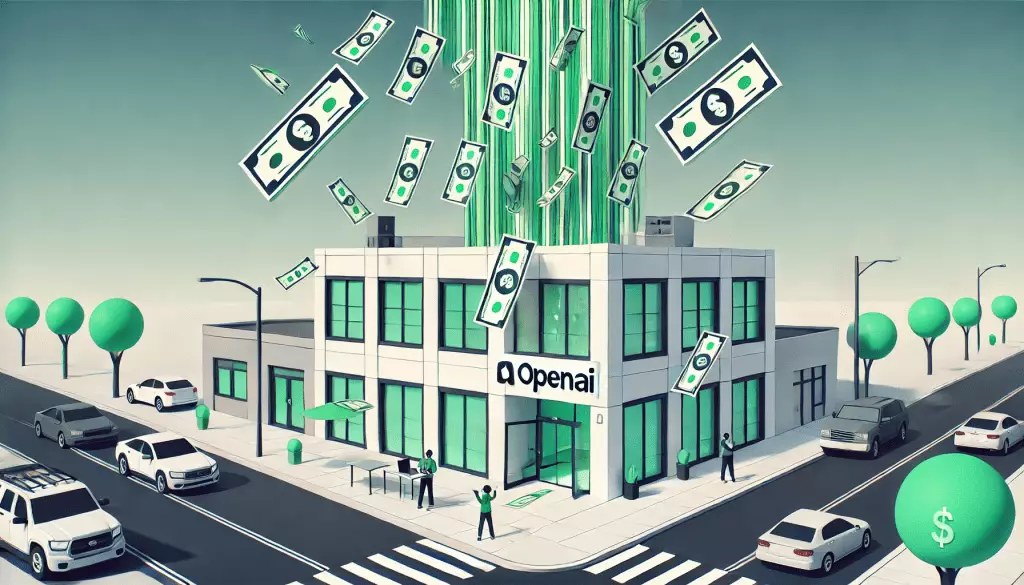In a striking turn of events, OpenAI has successfully completed a substantial funding round, securing an astonishing $6.6 billion at a total valuation of $157 billion—an achievement that marks it as the largest venture capital round in history. Despite tumultuous waves of executive turnover recently, including the resignation of significant figures like Mira Murati, OpenAI continues to attract considerable investments, signaling robust investor confidence. Noteworthy participants in this funding round include Thrive Capital, Nvidia, and Microsoft, contributing to a financial boost aimed at reinforcing OpenAI’s standing in the competitive realm of artificial intelligence.
OpenAI reports that its flagship product, ChatGPT, boasts over 250 million unique weekly users, offering a compelling foundation for its ambitious plans to enhance its AI research and capabilities. Through their official communication, the company outlined its goal of maintaining leadership in frontier AI research and increasing computational resources. This clarity of purpose is essential, especially as the landscape of AI development grows increasingly crowded and competitive.
Nevertheless, this triumphant announcement is not without its critics. Esteemed tech analyst Ed Zitron, in a recent newsletter, questions the long-term sustainability of OpenAI’s business model. He points out the risks associated with relying heavily on subscriptions from ChatGPT users, rather than diversifying revenue sources through licensing and API interactions. Additionally, Zitron highlights OpenAI’s controversial decision to accept substantial investment from SoftBank, a firm with a checkered history, including notable failures like WeWork. Such concerns raise valid points regarding the fragility of OpenAI’s future as a for-profit entity, prompting investors and consumers alike to reassess the company’s long-term prospects.
Adding more intrigue to this landscape is the reported reluctance of tech giant Apple to invest in OpenAI. This aligns with broader skepticism regarding the company’s strategic decisions and leadership stability, igniting discussions about whether OpenAI is well-equipped to navigate its current trajectory.
As the funding celebrations echo, the competitive pressures around OpenAI are intensifying. Competitors such as Anthropic, which features former OpenAI researchers, and Elon Musk’s xAI are developing their offerings with increasing sophistication. Reports indicate that some of OpenAI’s investors were asked to refrain from funding rival platforms, indicating a strategic defense against escalating competition. This unusual requirement suggests a palpable anxiety within OpenAI regarding the advancements of its counterparts, capable of siphoning attention away from its own products.
The AI field is rapidly evolving, with new models and systems quickly emerging. Liquid AI, for instance, has introduced innovative non-transformer-based models, pushing the industry further into uncharted territories. Google and Anthropic continue to release compelling products, while companies like Meta and Alibaba offer powerful open-source alternatives. In this fast-moving sector, it is critical for OpenAI to not only maintain its edge but to continually innovate to empower its developers and users.
OpenAI’s substantial influx of capital raises pressing questions about future financial strategies, particularly around its revenue-sharing model for custom GPTs. The introduction of the GPT Store—an ‘AI app store’ of sorts—has created fertile ground for user-generated content and bespoke AI capabilities. As users of ChatGPT Plus engage with this platform, the potential for income generation presents an exciting avenue for both creators and the company.
Despite early indications from CEO Sam Altman that revenue sharing would take place, information on actual payouts has been sparse. With recent funding in hand, a greater commitment from OpenAI towards rewarding creators could solidify community engagement and drive broader adoption of their platforms. Such moves would be crucial, as a thriving ecosystem of developers is integral to sustaining OpenAI’s innovation pipeline.
Although concerns regarding leadership turbulence and market competition are valid, OpenAI’s significant financial backing appears to secure its trajectory for the time being. The ongoing development of innovative AI models alongside a stable base of developers leveraging its resources positions OpenAI as a formidable presence in the AI domain.
The company’s ability to pivot in response to both internal and external pressures is commendable. If OpenAI continues to adapt, remain responsive to market demands, and prioritize customer engagement, it may not only endure the current challenges but also shape the future course of artificial intelligence—a goal that could redefine industries and societal functions alike. As the AI narrative unfolds, it will be intriguing to witness whether OpenAI can maintain its momentum and deliver on its vast potential.


Leave a Reply